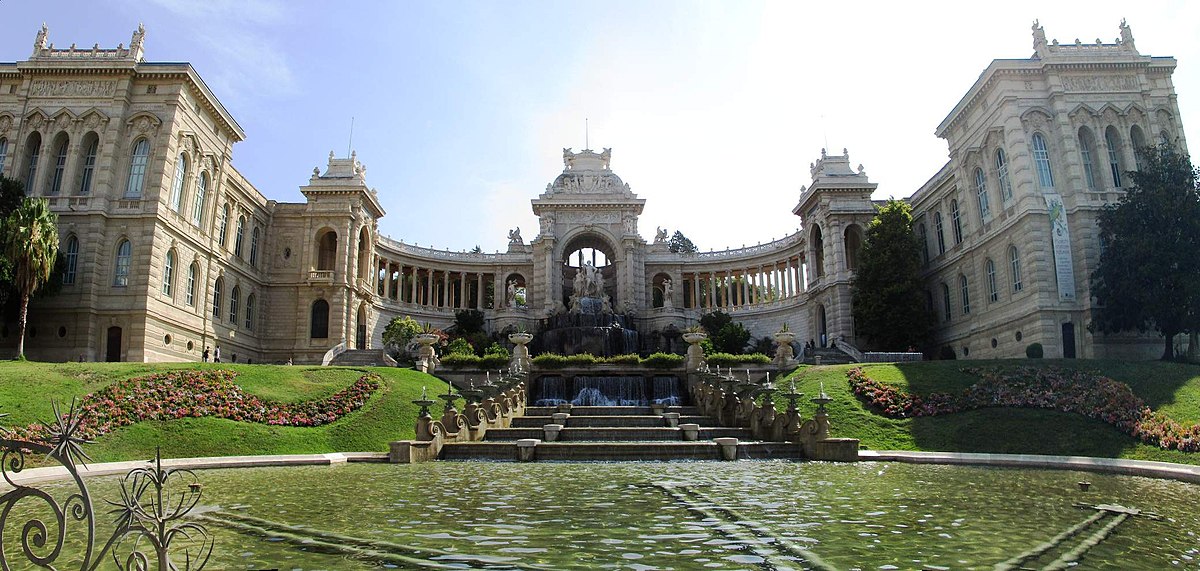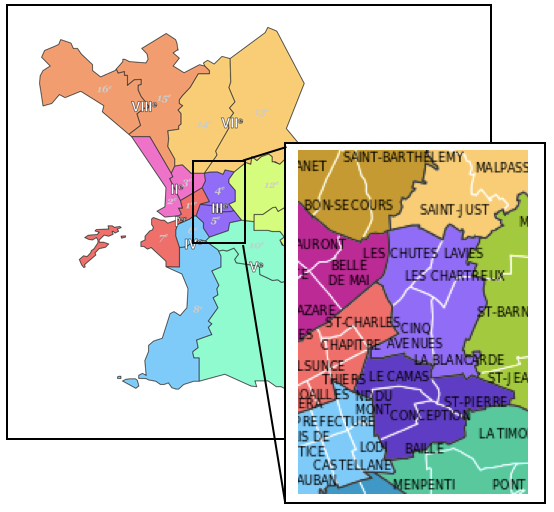L'Atelier Marseille 4-5
The Atelier du 4-5 is an initiative run by the Observatoire des Villes en Transition, des Politiques et des Pratiques Alternatives (Maison Méditerranéenne des Sciences de l'Homme, Aix Marseille Université-CNRS), for a period of 3 years (2022-23 to 2024-25). The aim of the Atelier is to host and support teaching and research practices that use Marseille's 4th and 5th arrondissements as a study site to examine political, social and urban change; and to put this work into dialogue with the public (residents and public authorities) to promote collective knowledge and action. L'Atelier is independent, although it aims to work in partnership with local players (local council, civil society).

ITS AIM IS THREEFOLD:
- educationalby involving students in the production and discussion of knowledge relevant to local (public or collective) action - in a context where the existence of a partnership and a multi-year project will make it possible to draw on the knowledge and networks already built up.
- researchThe aim is to understand and theorise the process of 'ordinary urban change': how it is made, its opportunities, constraints, methods and limits. The choice of research themes that are relevant to local players, and the circulation and debate of the results over several years, provide an opportunity to observe this process.
- a form of support for local public or collective actionby producing, disseminating and debating applied and critical knowledge about collective action and local urban transformations, between researchers and students, civil society, elected representatives and local officials.
WHAT IS A "WORKSHOP"?
The idea of the workshop is to focus multidisciplinary research and teaching on a local urban area (the 4-5) for several years, in order to build up, over the course of a term of office, a detailed knowledge of the area, the players (public, collective & voluntary), the institutions and instruments for development and collective action that are deployed there. It is based on two principles:
- The production of knowledge (by students with their teachers, by researchers) is thought out in advance with local playersand integrates forms of return to the public or to targeted groups (local councillors, municipal staff, associations) - in order to enrich the collective debate. In other words, a form of feedback must be an explicit part of student work / researchThe format is adapted to the nature of the subject, its audience and the way in which it is discussed, as well as to the level of the students, the length of the survey, their discipline and the importance of the Workshop project in the module.
- As far as possible, the knowledge produced is circulated and made freely available, in order to building a public archive on which to deepen the collective production of knowledge, but also to enable debate and collective reflection. Publicising knowledge in this way requires extensive editing and consolidation work (for the best student work), produced by the teachers and/or coordinators of the Workshop, and their publication, in an adapted format, on various media (website and other public platforms; local newsletters; scientific journals and events).
To this end, the coordinators provide support for the courses/projects hosted by the Atelier - background information, relevant potential themes, contacts, possible forms of feedback, help with publishing and promoting the work (eventually, a small budget for feedback events). Any project, from the lightest (observation and short survey, statistical file, L1 level) to the most complex (Masters, doctorate or research project) can find a place in it - from any higher education institution interested in taking part, in compliance with the principles set out above.
THE 4-5 SECTOR IN MARSEILLE
The choice of the 4th-5th arrondissements of Marseilles was based first and foremost on the existence of links with elected representatives and associations in the area, which make this committed research exercise relevant. The interest of this area for a Workshop is twofold:
- It is a socially diverse area, covering middle-class neighbourhoods to the south (Baille, Conception), neighbourhoods in the process of gentrification (Camas, Cinq Avenues), and more working-class neighbourhoods to the north and east (Saint-Pierre, Blancarde, Chartreux, Chutes Lavie). It includes a number of major facilities, some of which are the focus of local initiatives: Parc Longchamp, Blancarde station, Timone hospital and the mouth of the Marseille canal.
- This sector, one of the electoral pillars of the Printemps Marseillais movement, is led by Didier Jau (EELV). The town hall's ambition is to carry out pilot transition projects in the area, in terms of improving the quality of life, greening the area, reducing soil sealing, the social economy, social cohesion and local democracy.
The idea for teacher-researchers is to working on the making of "ordinary" transitionsThis is a socially mixed neighbourhood, run by a proactive local authority team and an active community network, working on everyday spaces and practices rather than on major projects.

Research themes 2022-23
For the first year, the Workshop envisages the following 4 major themes (to be discussed between the participating teacher-researchers and with the Workshop partners):
Public spaces, social diversity, ecological transition and local democracy
Coordinators :
Claire Bénit-Gbaffou is a lecturer in urban planning in the Department of Geography, Planning and Environment at Aix-Marseille University, and a researcher at MESOPOLHIS (CNRS-Sciences Po-AMU). She has extensive experience of collective and participatory research, having coordinated several similar types of partnership in Johannesburg, from the University of Wits, such as the Yeoville Studio (www.wits.ac.za/yeovillestudio), or the partnership with the municipal Parks and Gardens agency in Johannesburg.
Cesare Mattina is a lecturer in Sociology at Aix Marseille University, and a researcher at MESOPOLHIS (CNRS-Sciences Po-AMU). For a long time he has worked in Marseille, taking a localised approach to politics (clientelism, city government, local elected representatives), where for several years he has been developing field workshops with undergraduate and postgraduate students.
Etienne Ballanis a sociologist and urban planner who teaches at the Ecole Nationale Supérieure du Paysage (ENSP) in Marseille. For several years, he has been coordinating workshops in the 4-5 sector with his Masters students. Co-founder of the Arènes association in Marseille, and Chairman of the Commission Particulière du Débat Public (CPDP), he has extensive experience of managing urban change, ecological transition and participatory democracy, in Marseille and elsewhere.
